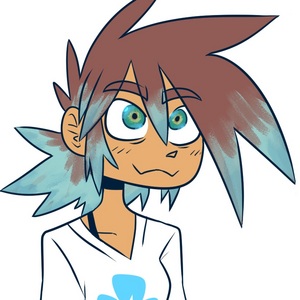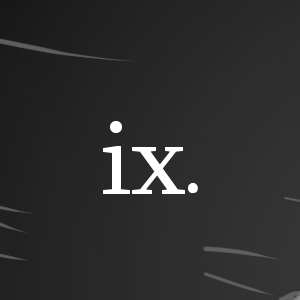We had a campfire for ourselves; me, my grandmother, my aunt, and my cousins. We roasted fruit on a stick, and they toasted some kind of sticky goop, that bubbled when it got hot. They called it 'puff', but en français, it was pâté de guimauve: a bone-ground paste mixed with marshmallow root for sweetness, which apparently, got quite gooey when chewed. I stayed away from it, but the smell made me jealous, and I wound up giving in for one, then another. And I had three by the time I decided to stop. The Rationner had baked a pie, and just to be festive, I had some of that for myself as well. It was made from the berries I'd picked, and some things she'd bought from the market. The grain, predictably, made me itch, but the taste was a reward for all my struggles of the past four years. If only I could have found a recipe that would make the same taste, without the things that made my stomach turn. We talked about the years past, and what was good about them. But there wasn't as much as we would have liked to say. When we asked ourselves why, it led to us cracking jokes about The Barreler's trite comments, and the stupid way he said as low as he possibly could, "Yyyyuuuhp." Then when his guard was down, his voice was a full pitch higher. Like he was constantly pushing the air from a place that would make him seem more grand, and imposing. We shook our heads and laughed at his faulty act, each recalling a time when he'd shown himself as anything but grand, and imposing for all the wrong reasons. He had, apparently, been especially harsh to The Collector when she'd had her first child, as well as to her younger sister. She was a member of the family I hadn't met yet, but heard was living in the mountains where my father, The Illustrator, had run off to. Suddenly, anger flashed inside my cage of ribs, to realize I was already about to leave. Any stories I could have heard over the years, those finer clarifications on old memories... I was going to miss out on them, wasn't I? I gritted my teeth, but tried to smile ever-so-slightly through it, my hand on my gut. Trying not to let show that anything was wrong. And in time, it passed. But the anger, even simmered, drove me to ask more questions than I would have normally dared. And instead of being shushed or ignored, I was finally given what I'd been looking for all along: a bit of backstory. If only I'd known it was so drole.
"So he lost that job, then lost the next, AND the next..." my aunt continued.
"And don't forget the one he just plain walked out on," my grandmother added.
My aunt jabbed, "At first, I thought you WERE him, and that he'd just lost weight. And gotten shorter," she laughed.
I stuck out my tongue. "I'm more of a scribe, and I'm not old enough to have kids. I actually liked taking care of the little ones here, though."
She looked at me like I'd just given the wrong answer. "You were terrible to them – all you did was order them around and pick fights. You pushed my youngest son at the ground, and now all he does is complain that his back hurts!"
Actually, I'd been cooking toast and eggs for them for the last year, every time their mother had errands in the village. Things I don't even eat anymore, I'd fire up the stove for them, juice or tea on the side. But you're not supposed to leverage those kinds of things in an argument, not against their actual primary caregiver. She'd have me beat a hundred to one, or more. Still, I felt unappreciated. I retorted, "Hey, he RAN at ME! All I did was stand still... with my arms out. I really did try with them, I'm just not very mature myself. Is he okay, then?"
She grunted. "Your dad would've had a spine about me making fun of him. Then he would've made a joke about dragging wounded people off in a coffin, or something. You really are different." She looked upset about it, somehow.
"Do you miss him?" I asked.
Both of them shrugged, and looked around. The stars were bright, the trees were visible by our campfire, and the fireflies were around the yard. The children sat a ways over, looking at stars. Frogs croaked. But nobody said they missed him.
"Huh," I replied to the silence. "I guess he wasn't that great a person."
She wavered her hand. "He wasn't a bad person... he just never did anything good, for anyone else. And he ate all our food, before we could get a shot. He's part of the reason I had to move out in the first place – nothing left to eat by the time he got there. I'm surprised he left at all, I didn't think he could leave our mother's basement! Hahaha."
I nodded, understanding. "So he was a shut-in."
The children ate hoof-globs on wheat crackers, and thumbed the goop into their mouths as they chewed. Ignoring the conversation for the concessions.
She said, "He was just moody, and never wanted to do anything. It was like the world wasn't good enough for him."
My aunt laughed, "Whoever your mother was, she must have had all the pity in the world – I can't believe he even got someone to bed."
It offended me, to learn my father by blood had been such a welp. He sounded like a drain on everyone else around him, for miles. I wondered if I was like that too, or if I gave back enough. I looked around the yard, one last time, and saw all my hard work looking back at me. The sidewalks of stone, the rock beds for the trees, the flattened ground, and the garden beds. I decided that, yes, actually, I had.
After that, I only saw my grandfather one more time, when he was helping us carry our belongings into the carriage, for the new house. The Rationner was downsizing, and The Collector had earned enough for her own place in another town thanks to her eye-drops and oily-hands routine. She was even becoming a food expert, though I found her doctrine came from a less-than-reputable source, and seemed mostly to promote the kinds of foods people already ate, no matter how sick or large it made them. Her textbook had been paid for by The Great Seed Commission, who traded crop-seed worldwide (as far as they claimed). Her license came from The Agricultural Society, which handled livestock. It seemed a bit of a stacked deck in favor of those who stood to gain from her support, in name. But it was progress, nonetheless, and she'd be feeding her children finely on its rewards. I had inherited a desk and a sofa chair, which needed to be brought back to my father's house. I was nervous to even let The Barreler see where I lived, in case he tried to bother me while I was going about my day. But it eased my nerves when he said it was the most inconvenient, out-of-the-way location I could have possibly picked, and that he'd hoped to never return. Since the death of Thunder, I saw him at his most morose, and he was finally acting responsible enough to match his boasting. We hugged, and he patted my back a bit – but he smelled like garbage, somehow, so I pulled away faster than normal. I guessed he'd been taking out the trash, but it seemed odd, because I thought I'd done that myself earlier. Then he shook my hand, and thanked me for all my hard work on the grounds.
"I hate to say it," he said, "but without your help, we never would have sold that house. Pretty soon, I've gotta get back to the inn and pack. I'm shipping off for work again, tomorrow."
"Thank you," I told him. Feeling a sudden bravery, I then said, "I have respect for you, and what you did for the house. You've taught me a lot, in the years since I arrived. But you were terribly angry with the family, and very loud around the house. And that was when you weren't waking us all up, with your midnight pukes. I don't think that drinking is as good for you as you believe. But those are the worst things about you, as far as I know. I'm glad that I met my grandparents, and I'm proud to have learned what you had to teach."
He nodded too quick, like he was excited to hear the feedback. "I understand, I haven't always been the best grandparent. But I'm proud of you: you were always willing to learn. You've really grown since you first showed up at our door, and I'm proud to see who you've become." He looked like he'd just met himself for the first time, but I saw it for a good sign. Then he said, "I'm finally ready to leave this place, and become who I was meant to be."
I tilted my head, scarcely believing this was the same person I'd just spent four years not wanting to live with, who once whipped a toddler. It was like some of those Buddhist proverbs he was always digesting had actually reached his stomach, for once. But hearing he was planning to leave gave me a wave of relief, and I had to strain myself not to show it, or I'd seem rude. But to tell the truth, he didn't seem like he'd changed one bit – just that he'd gotten better at talking up the part. I could still remember, three weeks ago, when I saw him at his most intense, as we returned from the market.
I asked him, once more, "What do you remember of The Illustrator?"
He just said, as he always did, "I don't know what you're talking about. There's nothing to say."
He still wouldn't tell me, even after all these years. I got chuffed, and said, "Well, anyway – I appreciate you and my grandmother taking me in, but I can't wait to get out on my own, and back to my father's house."
Instead of being happy for me then, he was offended. Deeply, deeply angered, knuckles white on the reigns. It was as if he was trying not to kill me. Then he growled, "You're MY family. -I- raised you." His face had turned red.
Undaunted, I said back, "Part of the way."
I thought he was going to snap, but he didn't. He said not a word back, the rest of the trip. When he got back, the first thing he did was leave again, for the pub.
I returned from my memory, and found myself hanging on a lack of words. So I shrugged with a laugh, and said, "If that's what you have to do." The next week, he was gone.
It took me another week to get the place clean and dusted, but it was worth it: my home was my own again, spiders chased out and webs between twigs in the backyard somewhere. Not that we have much of a yard, being that we're up against the woods. Or, I mean to say... I am. My house is, is what I'm trying to say. I was fifteen then, and legally (according to The King), the proud owner of my family home. No offense to my grandparents, but The Mentor, The Surgeon, and Teacher still felt like my real family. Perhaps it was because living with my blood had been, all things considered, a remarkably difficult time. But I enjoyed the work often enough, and learning where I came from. The rest of my origins would have to remain a mystery. I walked outside, to lounge in a lawn chair that I'd found in the storage shed, and had forgotten all about. It was dusty, like everything else inside, so I'd need my talent for restoration to reclaim it. Outside, the grass was yellowed, and the reapers of taller age were threshing. The Manager saw me yawning outside my house, and decided that because I was old enough, I should work as well, if I wanted some coin. I did need it, actually, if I wanted to eat... now that I was on my own again.
He asked, "What's your name, boy?"
I said, "Don't have one – everyone calls me The Reaper."
"I've never seen you with a sickle," he replied.
"It was a joke," I shrugged, "they said that was all I'd amount to."
"How lucky for you," he chuckled. "That's exactly what I need."












Comments (0)
See all